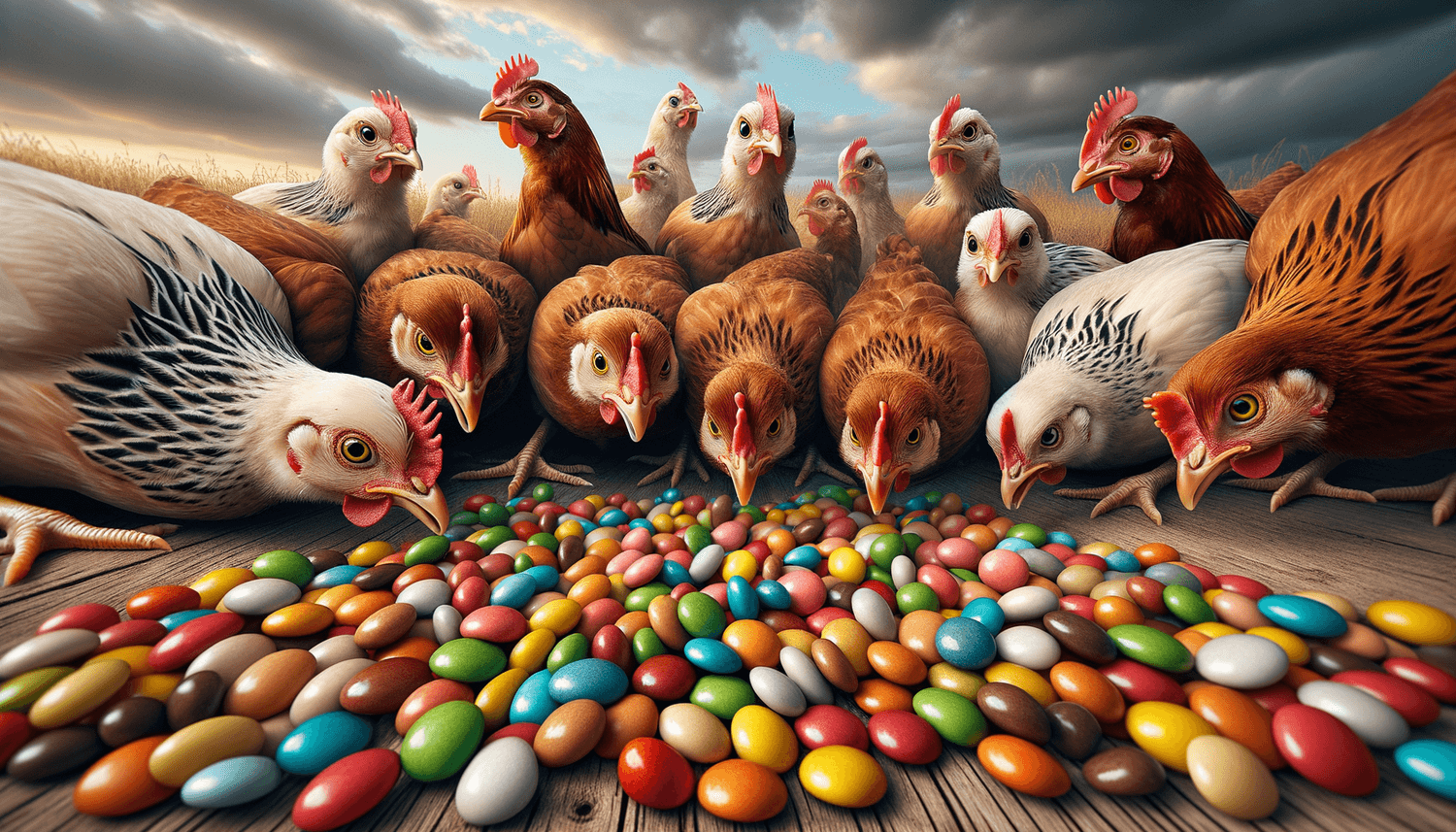🐔🍭 Welcome, feathered-friend enthusiasts, to our latest cluck-tastic post exploring the world of chickens and their eating habits! Today, we’ll be pecking into the deliciously sweet question, “Can chickens eat candy?” From gumdrops and licorice to chocolate eggs and sugar plums, we’re here to find out if our feathered friends can indulge in these treats. So, sit back and get ready as we dive into the importance of a balanced diet, benefits and/or risks, the nutritional value of candy, and how to prepare these sugary delights for your clucking flock. Let’s get egg-cited about learning! 🍬🐔
Can chickens eat candy?
No, chickens should not eat candy. Candy is high in sugar and contains artificial additives, which are not suitable for a chicken’s digestive system. Feeding candy to chickens can lead to health issues such as obesity, digestive problems, and nutrient deficiencies, making it an unsafe choice for their diet.
A balanced diet for chickens
Just like humans, chickens need a balanced diet to maintain optimal health and wellness. Good nutrition is essential for their growth, egg production, and immune system functionality. A healthy diet for our feathered friends primarily consists of a high-quality chicken feed, which should make up around 80-90% of their diet. Chicken feed is specially formulated to provide your flock with the necessary nutrients, vitamins, and minerals to support their wellbeing.
The remaining 10-20% of a chicken’s diet can consist of tasty and nutritious treats like fruits and vegetables. These provide variety and additional nutrients to your flock, and can also serve as a great way to help you bond with your birds. Remember, moderation is key, as overfeeding treats can disrupt the balance of their diet and lead to health issues. So, if you’d like to indulge your flock with some tasty tidbits, focus on providing nutrients rather than sugar-loaded treats like candy.
Nutritional value of candy for chickens.
Candy, though enjoyable for humans, holds little to no nutritional value for chickens. Most candies are high in sugar and often contain artificial colors, flavors, and preservatives, which serve no benefit for our feathered friends. Chickens have a unique digestive system optimized to extract nutrients from their natural diet, making it difficult for them to process and benefit from the contents of candy.
Furthermore, candy lacks essential vitamins, minerals, and other nutrients necessary for the health and well-being of your flock. Their nutritional needs are better met through their regular chicken feed and additional healthy treats such as fruits and vegetables. While candy may be a delightful treat for humans, it is not suitable nor beneficial for chickens, and they should not eat it.
Nutrition table of candy for chickens.
| Information | Description |
|---|---|
| Nutritional Value | Little to no nutritional value, high in sugar |
| Suggested Serving Size | Not recommended for consumption |
| Safe Feeding Practices | Avoid feeding candy to chickens |
| Preparation | Not applicable as candy should not be fed to chickens |
| Potential Risks | Obesity, digestive problems, nutrient deficiencies |
| Hydration | No hydration benefits; sugar content can worsen dehydration |
| Digestion | Poorly suited to chicken’s digestive system |
| Seasonal Availability | Not applicable as candy should not be fed to chickens |
| Other Benefits | None for chickens |
Healthy treat alternatives
Instead of offering candy to your chickens, there are many other nutritious options that provide benefits to their health and happiness. Providing variety in your flock’s diet ensures they receive the necessary nutrients to maintain their well-being. Here’s a list of some healthy treat alternatives your chickens will love:
- Fruits: Apples, pears, berries, cherries, and grapes (seedless)
- Vegetables: Leafy greens, cabbage, broccoli, pumpkin, squash, and carrots
- Herbs: Oregano, parsley, and mint are great for boosting their immune system
- Grains: Cooked oats, barley, quinoa, and wheat provide energy and fiber
- Protein: Mealworms, soldier fly larvae, or chopped up hard-boiled eggs offer additional protein for feather and egg production
Always ensure any fruits or vegetables fed to your chickens are pesticide-free and cut into bite-size pieces to minimize choking hazards. Keep in mind moderation and the 80-90% feed to 10-20% treat rule to avoid disrupting a balanced diet.
Monitor your chickens’ health
Ultimately, the health and well-being of your chickens is your priority. If you suspect any health issues related to poor diet or other factors, consult a veterinarian experienced with poultry care. A keen eye on their behavior, general health, egg production, and weight may help you identify potential problems early.
In conclusion, while candy may be a tempting treat for humans, it’s best to keep it away from our feathered friends. Stick to a balanced diet consisting primarily of high-quality chicken feed, while providing an array of fruits, vegetables, and other nutritious treats to keep your flock healthy and happy.

















